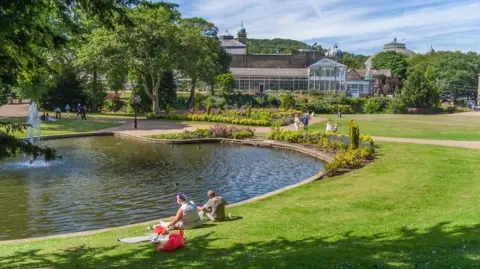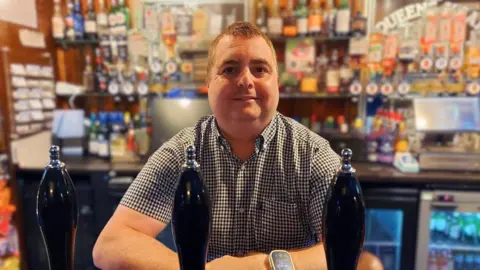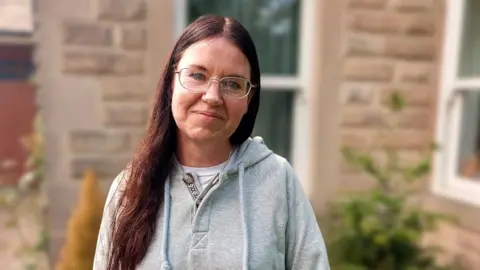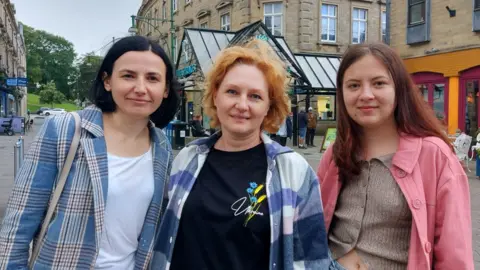Why one small town with very little immigration turned to Reform UK
2 hours agoMichael Buchanan,Social affairs correspondent and Adam Eley,BBC News

 Getty Images
Getty ImagesHere in the heart of the Peak District, there is one main issue on people’s minds: everyone in the laid-back spa town of Buxton, it seems, has a view on plans for a £100m redevelopment of the town centre.
As part of the redevelopment, the River Wye, currently running narrow and shallow through the centre of town, is to be widened. When the plans were posted on one Facebook group, the first comment underneath read: “Open up the river, yeah so the dinghies can [head] straight to the hotel!”
Immigration, perhaps, is the second biggest issue on people’s minds – even though there are very few immigrants in this Derbyshire town of 20,000 people, known for its opera house and grand Georgian crescent. It was such concerns that helped Reform UK win control of Derbyshire County Council in May.
The rise of Reform UK in the opinion polls, and the fact immigration is now the top concern for voters across the country according to YouGov, is not seen only in the places with most immigration. It is apparent even in small towns like Buxton, that has very little.
In May, Reform UK won in one Buxton county council ward and came a close second to the Conservatives in the other.
It is 250 miles from here to Dover, where the small boats arrive, and there are no hotels in Buxton housing asylum seekers.
In fact, the latest government figures show that in June, of the nearly 103,000 asylum seekers being accommodated across the UK, none of them lived in High Peak Borough Council, the area that covers Buxton. Yet six months ago, in the county council elections in Buxton, almost a third of those who voted backed Reform UK.
“I do see faces that I haven’t seen before,” says Robert Stordy, standing by the town’s market on a Tuesday lunchtime, although he admits he does not know where those new faces are from.
The 74-year-old describes himself as disillusioned by recent governments, both Conservative and Labour. He believes most of the young men arriving on boats are here to work, not fleeing oppression.
“They’re using our facilities. This country is strapped for cash – the NHS is all over the place, it’s suffering greatly. It puts pressure on local doctors, local services.”


What is clear in Buxton is the chasm in opinion on immigration between the town’s young and old, a sentiment Ian Howarth, who runs the Queen’s Head Hotel, hears regularly. Buxton’s population is older than the England average.
Describing the town as “a large village really”, Mr Howarth, whose sister is a Tory MP, spends his days leading the charge over car parking spaces linked to the town redevelopment and lending an ear to vociferous discussions about immigration. “It’s a generational thing,” he says. “The younger crowd are very much against it [Reform UK] while the older crowd are very much for them.”
Indeed, an hour with some sixth formers at Buxton Community School brings home his point. The overwhelming sentiment of the 10 teenagers is that immigrants are being scapegoated.
“I think there’s a lot of prejudice in this country about people who aren’t white,” says Henry. “If the people coming over on the boats were rich and white, it would be completely different.”
Another pupil, Elliott, feels that asylum seekers “are doing it because they’ve no other choice. Their only hope is to get away from the horrible things happening where they’ve come from and we’re treating them like they’re not welcome.”
The teenagers don’t yet have a vote though, and in May’s local elections, those who turned out gave Reform UK a sweeping victory – the party winning 42 of Derbyshire’s County Council’s 64 seats. The party also gained control of nine other councils across England.


Among the new Reform UK councillors is Melandra Smith, who won one of the two Buxton seats. A fluent Japanese speaker, she was known as a local campaigner before she became involved in party politics.
She pushed for Buxton to have a town council and for repairs to its many potholes – as Britain’s highest market town, the weather often leaves its mark.
She was also heavily involved in a campaign to stop the University of Derby turning its now empty 274-room hall of residence in the town into dispersal accommodation for asylum seekers. The plan, announced in 2023, was opposed by thousands of people in Buxton and dropped by the university in 2024.
It was “a wake-up call for the town”, she says.
The mother of two acknowledges her local profile helped her electorally, but says that, increasingly, people are contacting her about illegal immigration.
“The university halls are still not being used for anything and there are other large buildings in Buxton that are not currently in use and [people] worry, ‘Will they turn it into one of these dispersal centres?’ I get a lot of questions about this. Sometimes it’s a little bit irrational, too much of a worry.”
Those ongoing fears, she feels, are, however, a consequence of government policies “because there doesn’t seem to be any thoughtful plan nationally to deal with the people coming in illegally”.
On Spring Gardens, Buxton’s main shopping street, people hark back to a bygone age.
At first glance, the High Street appears to be holding up well in comparison with many towns. A steady stream of tourists means there are a raft of coffee shops and bakeries and few empty premises. However, “there’s nothing we actually need”, says Yvonne, 50, looking around at the local shopfronts.
“If you need to buy children’s clothes and shoes, there’s nothing.” Her disappointment at what is happening locally is exacerbated by the national picture.
“I haven’t got faith in anything any more – there is nobody out there that is offering me any hope. They tell you one thing and do something else, so it doesn’t matter who you decide [to vote for].”
That sentiment of powerlessness, hopelessness even, permeates many conversations. Older people do not want illegal immigrants in their town, in their country, but feel they cannot stop them. And they feel similarly impotent over what they do want – a bustling High Street, a new medical centre. Plans for a £20m health hub for Buxton, for instance, failed to get government funding in 2023, leaving the proposed site derelict and unsightly.


There have been some immigrants who have come to Buxton.
In 2022, about 150 Ukrainians moved to the town and people “opened their houses, their hearts to us”, says Natalia.
About 100 or so are still here, she says, sitting alongside two friends – Paulina and Yulia – on a bench in the centre of town.
Most have moved into their own accommodation and found jobs, a lot in hospitality and cleaning.
“We don’t feel like immigrants because we lived with British families and we are very closely connected with these families,” says Natalia. “I feel a part of society because I did not get any negative emotion from British people.”
Also on Spring Gardens, Liam McGuinness says he does not have a problem with the Ukrainians or indeed “against families coming in that need help. It’s more single men”.
He brings up the University of Derby’s abandoned proposals. “I wasn’t happy at the thought of maybe having 300 single blokes down here. They might be able to melt away in a big city, but if you’ve got them in the size of Buxton, it’s a different matter.”
The 68-year-old, originally from County Armagh, says he would support the idea of housing asylum seekers in army camps – as well as allowing them to work, perhaps helping farmers or others in need of labour, to offset the cost of their accommodation.
“I would think the majority would want to work but the law does not allow them to work. Then they’re going to sit around the towns and parks, which is obviously causing people problems.”
Supporters of immigration often point to the benefits that immigrants bring, particularly to the NHS. But in Buxton, that is not so obvious, particularly as there is no major local hospital. The town, encircled by the Peak District, is about an hour from the nearest cities – Derby, Manchester, Sheffield and Stoke – and statistics show that Derbyshire social care and NHS workforce is significantly less diverse than the national average. Without any distinct benefits locally, perception of the national picture dominates residents’ opinions.
“We’ve got enough people [living] on the streets that we need to look after ourselves,” says Gail Hartington, 69, sitting by some late-blooming plants close to Miltons Tap bar. “They’re coming over and getting money from the government; we need to concentrate on [our] own first.”


In 2024, the Sunday Times named Buxton as one of the best places to live in the UK, describing it as a “cultural powerhouse”, highlighting both the opera house and annual international festival. The town’s new development proposals also describe it as a “sleeping giant”.
But those garlands do not impress the town’s youngsters. A couple of the teenagers at the school actually want to leave Britain, never mind Buxton, so furious are they with the state of the country. One young man says he regularly argues with his grandmother and father over the small boat arrivals as “both say as soon as they set foot in Dover, they should just be put on a boat and sent straight back”.
The sense that Buxton’s best days – Britain’s best days, even – lay behind it has permeated the minds of these teenagers, too. Few feel optimistic, with worries about student debts, jobs and affordable housing being mentioned as well as the general state of the nation. One young woman does stand out, however. Asked what made her feel hopeful, Jodie says it is mainly because “things can’t really get much worse, to be honest”.